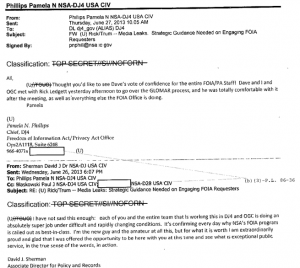No, Obama Doesn’t Need Legislation to Fix the Dragnet–Unless the “Fix” Isn’t One
In an editorial calling on Congress to pass the USA Freedom Act, the USA Today makes this claim.
Obama’s proposal last January — to leave the data with phone companies, instead of with the government — can’t happen without a new law. And, as in so many other areas, the deeply divided Congress has failed to produce one.
I don’t know whether that is or is not the case.
I do know 3 Senate Intelligence Committee members say it is not the case.
Ron Wyden, Mark Udall, and Martin Heinrich wrote Obama a letter making just this point in June. They argued that Obama could accomplish most, if not all, of what he claimed he wanted without legislation, largely with a combination of Section 215 Orders to get hops and Pen Registers to get prospective collection.
[W]e believe that, in the meantime, the government already has sufficient authorities today to implement most, if not all, of the Section 215 reforms laid out in your proposal without delay in a way that does not harm our national security. More comprehensive congressional action is vital, but the executive branch need not wait for Congress to end the dragnet collection of millions of Americans’ phone records for a number of reasons.
First, we believe that the Foreign Intelligence Surveillance Court’s (FISC) expansive interpretation of the USA PATRIOT Act to allow the collection of millions of Americans’ phone records makes it likely that the FISC would also agree to a more narrowly-drawn interpretation of the law, without requiring further congressional action. Certainly, it seems likely that the FISC would permit the executive branch to use its current authorities to obtain phone records up to two “hops” from a suspicious phone number or to compel technical assistance by and compensation for recipients of court orders. Unless the FISC has already rejected such a request from the government, it does not seem necessary for the executive branch to wait for Congress before taking action.
Second, we believe that the FISC would likely approve the defined and limited prospective searches for records envisioned under your proposal pursuant to current USA PATRIOT Act Section 214 pen register authorities, given how broadly it has previous interpreted these authorities. Again, we believe it is vital for Congress to enact reforms, but we also believe that the government has sufficient authorities today under the USA PATRIOT Act to conduct these targeted prospective searches in the interim.
Finally, although we have seen no evidence that the government has needed the bulk phone records collection program to attain any time-sensitive objectives, we agree that new legislation should provide clear emergency authorities to allow the government to obtain court approval of individual queries after the fact under specific circumstances. The law currently allows prospective emergency acquisitions of call records under Section 403 of the Foreign Intelligence Surveillance Act (FISA), and the acquisition of past records without judicial review under national security letter authorities. While utilizing a patchwork of authorities is not ideal, it could be done on an interim basis, while Congress works to pass legislation.
Just weeks before they sent this, Deputy Attorney General James Cole had seemed to say they could (if not already were) getting hybrid orders, in that case mixing phone and location. So it seems like DOJ is confident they could use such hybrid orders, using Section 215 for the hops and Pen Registers for the prospective collection (though, given that they’re already using Section 215 for prospective collection, I’m not sure why they’d need to use hybrids to get anything but emergency orders).
And it makes sense. After all, the public claims about what the Call Detail Record provision would do, at least, describe it as a kind of Pen Register on steroids, 2-degrees of Pen Register. As the Senators suggest, FBI already gets two-degree information of historical records with mere NSLs, so it’d be surprising if they couldn’t get 2 degrees prospectively with a court order.
So at least according to three members of the Senate Intelligence Committee, USA Today is simply wrong.
Mind you, I’m not entirely convinced they’re right.
That’s because I suspect the new CDR provision is more than a Pen Register on steroids, is instead something far more intrusive, one that gets far beyond mere call records. I suspect the government will ask the telecoms to chain on location, address books, and more — as they do overseas — which would require far more than a prospective Pen Register and likely would require super immunity, as the bill provides.
I suspect the Senators are wrong, but if they are, it’s because Obama (or his Intelligence Community) wants something that is far more invasive then they’ve made out.
Still, for USAF supporters, there seems no question. If all Obama wants to replace the phone dragnet is prospective 2-degree call (not connection) chaining on RAS targets, he almost certainly has that authority.
But if he needs more authority, then chances are very good he’s asking for something far more than he has let on.
Update: Note, USAT makes at least one other clear error in this piece, as where it suggests the “the program” — the phone dragnet — imposes costs on cloud companies like Microsoft and Google.

